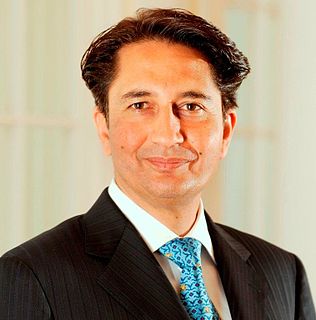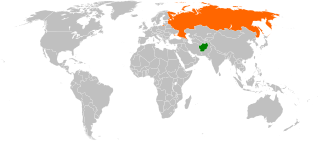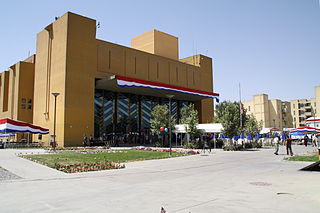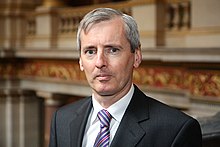
The foreign relations of Afghanistan are in a transitional phase since the 2021 fall of Kabul to the Taliban and the collapse of the internationally-recognized Islamic Republic of Afghanistan. No country has recognised the new regime, the Islamic Emirate of Afghanistan. Although some countries have engaged in informal diplomatic contact with the Islamic Emirate, formal relations remain limited to representatives of the Islamic Republic.

The Embassy of the United States of America in Baghdad is the diplomatic mission of the United States of America in the Republic of Iraq. Ambassador Alina Romanowski is currently the Chief of Mission.

Relations between Afghanistan and the United States began in 1921 under the leaderships of Amanullah Khan and Warren G. Harding, respectively. The first contact between the two nations occurred further back in the 1830s when the first recorded person from the United States explored Afghanistan. The United States government foreign aid program provided about $500 million in aid for economic development; the aid ended before the 1978 Saur Revolution. The Soviet invasion starting in December 1979 was a turning point in the Cold War, when As President Jimmy Carter provided $3 billion dollars in financial and diplomatic support to the anti-Soviet Mujahideen forces. Beginning in 1980, the United States began admitting thousands of Afghan refugees for resettlement, and provided money and weapons to the Mujahideen through Pakistan's Inter-Services Intelligence (ISI). The USSR withdrew its troops in 1989.

Said Tayeb Jawad is an Afghan politician and diplomat. He served as the last ambassador of the Islamic Republic of Afghanistan to the Russian Federation, from 2021 to 2022. From 2017 to 2020, Jawad served as Ambassador to the United Kingdom of Great Britain and Northern Ireland. From December 2003 to September 2010, Jawad served as Ambassador to the United States. He was also the non-resident Ambassador to Mexico, Brazil, Colombia and Argentina. From 2002 to 2003, he was Chief of Staff to President Hamid Karzai.

Relations between Afghanistan and Germany reach back into the late 19th century and have historically been strong. 100 years of "friendship" was celebrated in 2016, with the Afghan President calling it a "historical relationship".

Relations between Afghanistan and Russia first emerged in the 19th century. At the time they were placed in the context of "The Great Game", Russian–British confrontations over Afghanistan from 1840 to 1907. The Soviet Union was the first country to establish diplomatic relations with Afghanistan following the Third Anglo-Afghan War in 1919. On 28 February 1921, Afghanistan and Soviet Russia signed a Friendship Treaty. The Soviet Union intervened in Afghanistan against the Basmachi movement in 1929 and 1930.
The 2009 Kabul Indian embassy bombing was a suicide bomb attack on the Indian embassy in Kabul, Afghanistan on 8 October 2009 at 8:30 am local time. The bombing killed 17 people and wounded 63.

The Embassy of the United States of America in Kabul was the official diplomatic mission of the United States of America to the Islamic Republic of Afghanistan. The embassy was housed in a chancery located on Great Massoud Road in the Wazir Akbar Khan neighborhood of the Afghan capital, Kabul, and was built at a cost of nearly $800 million. On August 15, 2021, in the face of a Taliban advance on Kabul, embassy staff relocated to makeshift but secure facilities at Hamid Karzai International Airport. Kabul fell and the chancery building officially closed late August 15.

The Embassy of the United Kingdom in Tehran is the United Kingdom's diplomatic mission to the Islamic Republic of Iran. It is located at 172 Ferdowsi Avenue in Tehran.

The April 2012 Afghanistan attacks took place on Sunday, 15 April 2012, at around 13:00 local time when heavily armed Taliban insurgents and suicide bombers launched multiple coordinated attacks throughout Afghanistan. Insurgents launched the 2012 spring offensive on multiple locations, including government buildings, military bases, and embassies. Attacks occurred in four Afghan provinces, including Kabul and Paktia. Different reports attribute responsibility for the attacks to either Taliban or the Haqqani network although the Taliban have claimed responsibility.
On 31 May 2017, a truck bomb exploded in a crowded intersection in Kabul, Afghanistan, near the German embassy at about 08:25 local time during rush hour, killing over 150 and injuring 413, mostly civilians, and damaging several buildings in the embassy. The attack was the deadliest terror attack to take place in Kabul. The diplomatic quarter—in which the attack took place—is one of the most heavily fortified areas in the city, with 3-meter-tall (10 ft) blast walls, and access requires passing through several checkpoints. The explosion created a crater about 4.5 m (15 ft) wide and 3–4 m (10–13 ft) deep. Afghanistan's intelligence agency NDS claimed that the blast was planned by the Haqqani Network. Although no group has claimed responsibility, the Afghan Taliban are also a suspect but they have denied involvement and condemned the attack.

Afghanistan–France relations are the diplomatic relations between Afghanistan and France. Both nations are members of the United Nations.

The Embassy of Pakistan in Kabul is the diplomatic mission of Pakistan in Afghanistan. Pakistan also operates consulates in the Afghan cities of Herat, Jalalabad, Kandahar and Mazar-e-Sharif.

Large-scale evacuations of foreign citizens and some vulnerable Afghan citizens took place amid the withdrawal of US and NATO forces during the final days of the war in Afghanistan and the Taliban offensive in Afghanistan in 2021. After the fall of Kabul on 15 August 2021 and the collapse of the Islamic Republic of Afghanistan, Hamid Karzai International Airport remained the only non-Taliban controlled route out of the country, being protected by several thousand NATO troops.

Afghanistan–Italy relations refers to the diplomatic relations between Afghanistan and Italy which were formed in 1919. On June 3, 1921, they signed the agreement for the exchange of permanent Diplomatic mission and the centenary, on 2021, was celebrated with letters exchanged between their Chairs. Both nations are members of the United Nations but the new Afghanistan government is not recognized by them.















